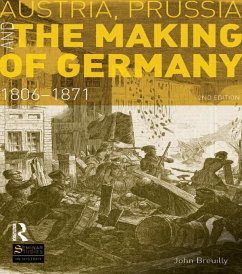It is often argued that the unification of Germany in 1871 was the inevitable result of the convergence of Prussian power and German nationalism. John Breuilly here shows that the true story was much more complex. For most of the nineteenth century Austria was the dominant power in the region. Prussian-led unification was highly unlikely up until the 1860s and even then was only possible because of the many other changes happening in Germany, Europe and the wider world.
Dieser Download kann aus rechtlichen Gründen nur mit Rechnungsadresse in A, B, BG, CY, CZ, D, DK, EW, E, FIN, F, GR, HR, H, IRL, I, LT, L, LR, M, NL, PL, P, R, S, SLO, SK ausgeliefert werden.

